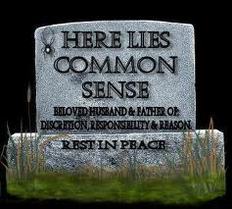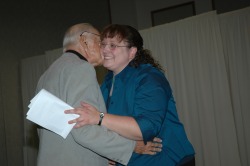So, recently I had someone ask me for advice on how to sell herself as someone who could do social media for an organization. The job position said that the person would be doing some light blogging and then posting to facebook and twitter with possibility for more. So, I thought I would post what I told her here:
I think showing that interest, passion and clear cut goal will go far. if you are really interested in blogging and doing other social media work for them, that should show as you interview. There are some other things you should be at least familiar with and should even be able to comment on (but not necessarily know EVERYTHING). To start:
1. Do you at least have the basic accounts? I know you have facebook, but what about twitter, instagram, foursquare, youtube, linkedin, pinterest, reddit, tumblr, flickr (these are certainly the big ones)?
2. Do you understand what a hashtag is and how it is used? I suggest googling it to get a better explanation than I can give.
3. Do you understand the importance of a meme and how it is used? Same comment from me here, google it.
4. Do you know what SEO is? Search Engine Optimization. This is usually a big part of the social media director's (or whatever the position is called) job and purview. Once again, google it if you are not familiar.
4. Understand that social media goes beyond these kinds of sites and then blogging. They need to go together in a concerted effort. And, they will usually take on a life of their own.
For instance, take this "binder" talk. Within minutes of Romney saying that he has "Binders full of Women," there were
Bindersfullofwomen.com and .net, etc. websites, facebook pages, twitter sites and memes galore. Within one hour of Romney saying that, the Bindersfullofwomen facebook page had over 80,000 "likes." Talk about VERY successful!!! They now have 343,552 likes only 2 days after the debate. But, people are doing heir own thing with this phrase. If you go to Amazon and look up a basic binder to buy, you will see all the comments are about putting women in binders.
Now, this is great for Obama, of course. But, look at this from a organizational standpoint. For instance, take the Chick-fil-a CEO comments and how that SM spiraled out of control both positively and negatively. What if it had ONLY been a negative issue with folks like liberals boycotting the restaurants and the conservatives of the world did NOT rise up and go eat there en mass? The negative social media hits for Chick-fil-a would have been disastrous. The social media, PR, marketing folks for Chick-fil-a would have needed to do a major PR and community relations campaign to deal with revenue loss. But, luckily for them, conservatives basically took care of the problem for them.
So, talk about examples like this to demonstrate that you see what happens in social media, you know the impact. Then, consider how it all comes around and works for the kind of organization you are interviewing at. In other places, social media, PR, marketing, it is all always about revenue. In the nonprofit sector (my friend was interviewing for the nonprofit sector), it can't be. The revenue for nonprofits is the number of people who become aware of an issue and get involved, or the number of people who are helped, etc. Your job is to recognize how social media can best be optimized to reach those goals. Certainly blogging helps to inform people of issues and facebook, twitter, reddit, etc. can get the information in a blog or article out to more people, but the person in the social media position for such an organization needs to think outside that box to create awareness, interest in the issue.
This is where some silly things come in such as flashmobs. For instance, consider the flashmob where a group does a dance in a shopping mall in honor of breast cancer awareness and the flashmob goes viral on all the sites. This fun dance has nothing to do with breast cancer, but by adding a breast cancer awareness ribbon image or something to the beginning and end of the video? There you have your link. You tag the video with "breastcancerawarenessflashmob" and soon people are hashtagging the video as #breastcancerawarenessflashmob on twitter and facebook as they share. So, often, we do things physically (a dance, a slip of speech in a debate) and it goes viral on social media. The key is having the eye for what is going to get noticed (such as "BindersFullofWomen"--damn I would have LOVED to have thought of that!).
The ultimate goal is really to get news media attention for your company, cause, product, or person. And, the other issue is that EVERYTHING, everything needs to be branded if you want the right type of hype. So, one key to social media is making sure the brand messages for the issue, product, company are consistent. You can't be doing one thing on twitter and something totally different and sending a different message on facebook. This does not mean that you don't word the messages differently so as to reach the right people in each social media sphere, but you have to make sure the messages do not in anyway contradict themselves. These are all things you should be saying that you think are important to know and practice when working with social media.
Here are some important sites and info that might be of help to you to review and be thinking about:
http://www.pr-squared.com/ Pretty much every blog on this site will be helpful.
http://www.duarte.com Great company, presentation gurus. Knowing and understanding presentation techniques is also key.
http://www.unconventionalbranding.com/about/ A ton of blog topics to bring you up to speed on branding.
http://www.personalizemedia.com/garys-social-media-count/ One of my favorite "infographic" type sites.
OH!!! The Inforgraphic!!! Very helpful for nonprofit issues, easy to share, fun to look at and get a point across. I have not yet found a free site that helps you make good infographics. If anyone knows of one, PLEASE share. I suppose you can do a pretty good job just using the Mac, but I know that Adobe Creative Suite programs are better. Likely Illustrator is the best. Ask the organization you are interviewing with if they have access to that software and will you be able to learn it!?! Of course, going in knowing it would give you an edge.
Also, everything is about telling the STORY. The brand has a story, the company has a story, the issue, product, etc. Social media is the most popular way to get the story out. Here is a guru's site for doing that:
http://www.chrisbrogan.com/ Okay, I am afraid to give you too much more as I am sure I have already overwhelmed you! But, here is one more:
http://mashable.com/2009/01/13/social-media-resume/ Mashable.com is the big social media news blog. If it is happening on social media and involves branding, marketing, PR, advertizing, they will be writing about it. It is almost more of a journalism news source than a blog anymore. This particular article I thought would be important for you. You might want to start putting something together along these lines for future positions.
But, I think if you can talk generally about some of the things I have discussed here, you can impress. Remember to show that you have a great interest and understand the importance of using social media and have some knowledge of how it all works in terms of branding and telling an organization's (or issue or person's) story.
Hope this helps and is not too overwhelming! It is something I love and find fascinating and wish I still taught, but I don't have the time to really keep up on it all myself with my present job.


 RSS Feed
RSS Feed